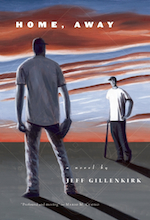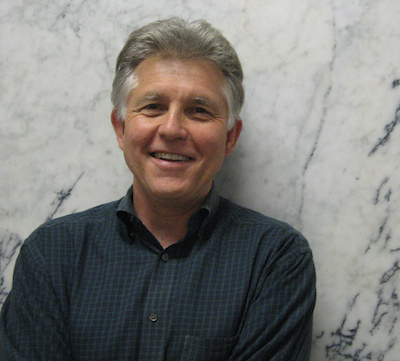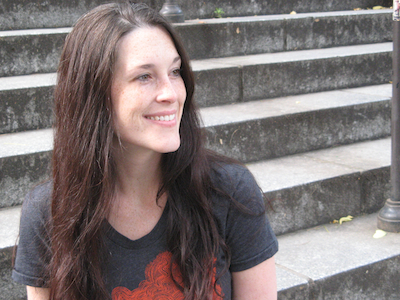An introduction to Jeff Gillenkirk, author of the new novel Home, Away (Chin Music Press, 2011). His is also the author of an award-winning nonfiction book, and his writing has appeared in numerous newspapers, magazines, and other publications. In Gillenkirk’s debut novel, the main character, Jason Thibodeaux, has a contract to pitch for the Colorado Rockies when the son he lost in a custody battle re-enters his life. With baseball as a backdrop, Home, Away explores family, what it means to be a father, and what people do for the ones they love. It’s the perfect Father’s Day read, and an inspiring look at how families can learn to pull together to face challenges in life.
Quick Facts on Jeff Gillenkirk
- Jeff Gillenkirk online
- Home: San Francisco, California
- Comfort food: A roast chicken rubbed with garlic and covered with herbs. I roast it with vegetables. It always turns out really well.
- Top reads: Leo Tolstoy, Fyodor Dostoevsky, Nikolai Gogol, Frank Norris, Theodore Dreiser, Graham Greene
- Current reads: Half of a Yellow Sun by Chimamanda Ngozi Adichie
What are you working on at the moment?
I finished and I’m trying to sell a new novel. It’s a political story of a journalist who uncovers the disturbing reality that American politics has been controlled by vampires for the last 200 years. I’m revising right now. I tend to do everything in multiple drafts. It usually takes me about five drafts, and I’d call this one at draft four and a half.
“It usually takes me about five drafts.”
Where did the idea for Home, Away come from?
I’ve been writing fiction for a long time, but Home, Away is my first published novel. It’s actually the fourth novel I’ve written. Its original conception was not as a novel; it was a book about fathers struggling with divorce, and divorced fathers struggling to stay in touch with their children despite some laws in this country that are somewhat unfavorable towards dads. Most fathers end up getting visiting rights instead of co-parenting rights. A lot of fathers get kind of cut out of their children’s lives, and it’s quite tragic. I was trying to write a book that showed that fathers can do it—fathers are nurturers.
That was how the nonfiction book began. But, I was told by publishers who read the book and found it compelling that they couldn’t sell it. I got 37 rejections. I had one publisher accept the manuscript only to call back two days later and say they couldn’t take it after all because the sales staff said they couldn’t sell it.
So, I was on a bike ride and feeling distraught about this, and I went by what’s now AT&T Park in San Francisco. It was filling up with fans for a baseball game, and my son who was five at the time was there with a friend of my ex-wife. I thought, “This is really strange. My son is there, and I’m here. What would it be like for a baseball player to look up into the stands and see his own kid in the stands with another guy?” I thought there might be a story there. I grabbed a legal pad and biked out to the ocean, and I sketched an outline, which I had never done before for a book. I could see the characters, I could feel them. I sat there on a bench for about two hours and I thought, “I’m going to do this.” And I did.
“I could see the characters,
I could feel them.”
Now, the background is that I had interviewed 12 fathers about divorce for the nonfiction book, I had experienced my own divorce, and I had lifetime love for baseball. All of these things came together, and I was able to write the book.
What do you hope readers will take away from your book?
There’s a myth that fathers are the providers, and that they are really clumsy and inept at home. That’s not true. The nurturing gene is part of all of us. Take away from it that fathers are doing this, can do this, and are doing it well—and that it shouldn’t be a surprise. It should be recognized and encouraged that dads do this.
Who do you picture as the ideal reader of your work?
The ideal readers would be both men and women who are going through divorce, or someone who is about to go through it. They should understand that they’re divorcing each other, they’re not divorcing their kids. I want people to understand that their kids need both of them in their life. You know, kids look to their parents to see how does the world work. If they see that their parents don’t work together, that everything looks awful, and it’s a war, then life is going to look that way to them, and they’re going to lose their way.
I wrote the book in what I hope is an accessible style. I imagine people who might not even normally read fiction would read this and get some sense of inspiration for hanging in there if they’re going through something similar. There’s no such thing as an ex-father. We have ex-wives and ex-husbands, but there’s no such thing as an ex-father. For people to come away with that would be really important.
“We have ex-wives and ex-husbands,
but there’s no such thing as an ex-father.”
Where and when do you prefer to write?
I have a small public relations business—that’s my day job. I plug in time to write whenever I can. I’ve written in the morning from 6am to 9am. If my work for hire gets done at 3pm then I’ll write until 6pm. I work at home in the evenings sometimes. Whenever I get the time. Once I get the idea for a book, I can pretty much work anywhere. I’m not fussy about it.
Where would you most want to live and write?
I have a fantasy of living in a small home with a lovely backyard and lots of sunshine (which we don’t have in San Francisco) in Sonoma County.
Do you listen to anything when you work?
I like silence. I like to hear my characters talking to me. I’ll sometimes catch myself speaking the stuff out loud while I’m typing it. I don’t want anything to interfere with that. I love music, but I don’t listen to it while I write.
Do you have a philosophy for how and why you write?
I grew up loving stories, and I would disappear into the work. My philosophy is I’m trying to take somebody somewhere that they haven’t been before, either geographically or emotionally, or even politically. I like books that have characters connecting to the history in their own time. I can disappear in that story. I try to write stories that become alive.
How do you balance content with form?
The characters create the structure themselves. They’re going to take me where they want to go. The outline I did originally for Home, Away actually worked out well. But, I’ve had other books where I’ve written an outline and two-thirds of the way through the characters are all pulling in different directions. The structure really depends upon the story. I try to create a structure that best expresses the content. The characters dictate what the form should be, they tell me where to go. They do become real—that’s the gratifying part of fiction, you end up having a whole bunch of imaginary friends.
Is there a quote about writing that motivates or inspires you?
Henry James (one that my favorite English professor at Georgetown used to throw at us): “Try to be one of the people on whom nothing is lost.” Notice everything. Fill up the database so as to draw from it later. Whenever I get lost in my own worries or petty obsessions, I remember James’s line and refocus on the world around me.
What do you find most challenging about writing?
The isolation. I don’t mind working. Whatever I’ve taken on, I’ve put in long hours. On a lot of projects, you’re working with other people. When you sit down to write, it’s just you, and a book can take a long time. Sometimes you think, my friends are all at the Giants game and I’d rather be with them. To get something done, you’ve got to give up a lot of that for the duration of the book.
What advice would you give to aspiring writers?
“It takes discipline, fortitude, and patience.”
Dorothy Parker’s admonition to bolt your butt to a chair and write. It takes discipline, fortitude, and patience. It’s not going to come out on it’s own. A lot of people say, “I want to write.” Well, you’ve got to sit down and write. You’ve got to discover what the best way for you to write is. Just start writing, and see what pleases you. Show your work around as well. Write for yourself—you have to like it first—but it is a form of communication, so other people have to get it. Have the courage to show it to people and it’s going to help you in the long run. Develop a good network of readers who will be honest with you, who can tell you if it’s working or not. Believe the ones you want to and don’t believe the ones you don’t want to—you’ll figure it out. One of the great occupational hazards is that you’re doing the work alone. That doesn’t mean you have to keep it to yourself.
What’s the best advice you’ve been given as a writer?
Rewrite. Years ago, I went to the Squaw Valley Writers Workshop with a novel that I thought was done. I got into workshop and everyone was tearing it apart. And Blair Fuller said, “You’ll learn about drafts.”
When you’re not writing, what do you like to do?
I spend so much time at the computer, reading and researching, and I get kind of jumpy. I ride a bike, I play tennis, I hike. I love to walk, and I’ll go all over the city and just watch people, listen, and look around. And, I love watching movies.
What about baseball?
Baseball is something I pursued really strongly as a young person. It’s so much in my blood, I just need to see 18 people on a field and I stop to watch. It doesn’t matter who they are, I love it at any level.
About Jeff Gillenkirk
Jeff Gillenkirk is an author and journalist whose articles and book reviews have appeared in the New York Times, Washington Post, Miami Herald, Los Angeles Times, San Francisco Chronicle, Parenting magazine, The Nation, Mother Jones, America and other publications. His nonfiction book, Bitter Melon: Inside America’s Last Rural All-Chinese Town, won the Commonwealth Club’s Silver Medal award for best California history. In addition to his writing, Gillenkirk provides strategic communications support for community-based organizations across the country. He lives in San Francisco with his son and extended family. Home, Away is his first novel.
Buy the book, preferably at your local independent bookstore.
[Toffoli, Marissa B. “Interview With Writer Jeff Gillenkirk.” Words With Writers (June 12, 2011), https://wordswithwriters.com/2011/06/12/jeff-gillenkirk/.%5D

Home, Away by Jeff Gillenkirk (Chin Music Press, 2011).




[…] You can also read a nice interview with him HERE. […]